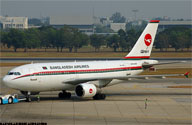When the chairman of the Airline Operators Committee recently described Suvarnabhumi Airport as "being in a coma" he was not referring to flight operations, which have always been safe and efficient.
What Jaiyavat Navaraj had in mind was the seeming inability of the Airports of Thailand Plc (AoT) to fix problems and get the trouble-plagued facility running properly. In other words, the AoT needs to pay less attention to the matter of raising its revenues and more to putting its house in order. And while it is doing that, it should also address the issue of putting a few other deserving houses in order, too.
For, if the airport authorities are sleeping on the job, the same cannot be said of residents living in housing estates around the airport. They have always been entitled to some sympathy for the extreme levels of noise, mental distress and for having to put up with the appalling delaying tactics employed by the AoT. But "taking back the sky" as they put it, is not the solution. Such direct action is wrong and fast losing them friends.
Their release of more than 100 balloons into the night sky early in January delayed flights by more than two hours and cost the AoT in excess of 19 million baht in compensation for airlines affected by the delays while flight paths were cleared. Lat Krabang police reacted by sending letters to all 32 communities around the airport, warning them not to repeat such an act. Had the law been fully enforced, those responsible could have been fined and jailed for up to seven years.
It may well be that only a tiny minority is resorting to civil disobedience, but it is harming the cause of all those with legitimate claims. And, on Tuesday, this embittered minority took further steps to damage their image. Fortunately, the airport control tower quickly spotted the 10 or so lanterns being floated in restricted airspace close to flight paths. Police were alerted and two people arrested. In some countries, such behaviour would be perceived as acts of sabotage or terrorism.
Had it not been for foot-dragging by the AoT, this could all have been resolved long ago. In fact, it should have been settled even before construction of the airport began. That was before some of those now demanding compensation had moved into the area and even before the Thaksin government had earmarked Suvarnabhumi as a future aerotropolis and province, causing land values to rise and prompting an influx of hopefuls.
The present outcry is from three groups of people. First up are those who, somewhat naively, thought that buying land and building a house next to a busy international airport a few years ago was a good idea, but are now having second thoughts. Some claim not to have known about the airport, which beggars belief. Joining them are speculators who invested in land and houses around Suvarnabhumi, expecting to make a handsome profit. A small but vocal number of these see cash as the only solution. Not soundproofing or necessarily moving to a quieter location. Just money.
The third group affected by aircraft noise are the long-term residents. They are fully deserving of our sympathy and entitled to generous compensation and having their houses soundproofed. The Surayud Chulanont cabinet set out a compensation framework last May which favoured those most affected by airport noise and disruption. What is needed now is a neutral arbiter to ensure the fairness of such awards.
If the AoT cannot handle it, the job should be given to someone who can. And if awards are contested, let the matter be settled without any of the prevailing hysteria in a court of law. That is why such courts exist.

 Bangkok - A hijacker on Tuesday forced a Biman Bangladesh Airlines flight from Malaysia to land at Bangkok's Don Mueang Airport, media reports said.
Bangkok - A hijacker on Tuesday forced a Biman Bangladesh Airlines flight from Malaysia to land at Bangkok's Don Mueang Airport, media reports said.






